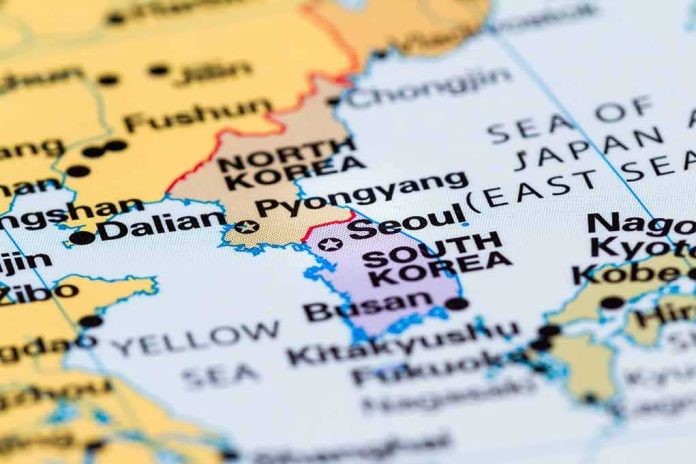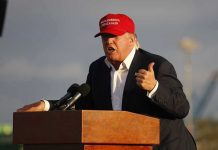
Six Americans now sit in South Korean detention cells after attempting to send bottles filled with Bibles, rice, and cash to North Korea, igniting international controversy over humanitarian aid versus national security concerns.
Key Takeaways
- Six American citizens were detained by South Korean authorities for attempting to send 1,600 plastic bottles containing rice, miniature Bibles, $1 bills, and USB sticks toward North Korea from Gwanghwa Island.
- The Americans are being investigated for potentially violating South Korea’s law on the management of safety and disasters, as the island is a restricted front-line border area.
- South Korea’s Constitutional Court overturned a previous ban on sending items to North Korea in 2023, but President Lee Jae Myung’s government continues to restrict such activities to avoid escalating tensions.
- The U.S. Embassy in South Korea has not yet commented on the detention of these American citizens.
- This incident occurs against a backdrop of stalled official talks between North and South Korea since 2019, following the collapse of U.S.-led denuclearization negotiations.
Americans Detained in Restricted Border Area
“SEOUL — Six Americans were detained Friday in South Korea for trying to send 1,600 plastic bottles filled with rice, miniature Bibles, $1 bills and USB sticks toward North Korea by sea, police said.”
The Americans were apprehended in the early hours of Friday on Gwanghwa Island, a highly sensitive and restricted area near the border with North Korea. South Korean authorities are now investigating the group for potential violations of the country’s safety and disaster management laws. The island’s designation as a danger zone makes unauthorized entry illegal, let alone attempting to send materials across the maritime border to North Korea. While authorities have confirmed the detention, they have not yet disclosed the identities of the Americans or revealed the contents of the USB sticks included in the bottles.
Six Americans were detained Friday in South Korea for trying to send 1,600 plastic bottles filled with rice, U.S. dollars bills and Bibles toward North Korea by sea, police said. https://t.co/yzFlRp6B0v
— ABC News (@ABC) June 27, 2025
Legal and Diplomatic Complications
“The US suspects were apprehended in the early hours of Friday morning after they were caught trying to release the bottles into the sea from Gwanghwa island, near a restricted front-line border area with North Korea, South Korea’s official Yonhap news agency reports.”
This incident has created a diplomatic quandary for both South Korean and American authorities. The U.S. Embassy in Seoul has maintained silence on the matter, neither confirming the identities of those detained nor issuing any statement about potential consular assistance. The timing is particularly sensitive as President Lee Jae Myung’s administration is actively working to decrease tensions with North Korea and potentially restart diplomatic talks. Any provocative actions, even those with humanitarian intent, risk undermining these delicate diplomatic efforts and could trigger an aggressive response from the North Korean regime.
Historical Context and North Korean Responses
The practice of sending items across the border has a contentious history. While South Korea’s Constitutional Court overturned a law criminalizing the sending of materials to North Korea in 2023 on free speech grounds, the government continues to discourage such activities through administrative orders and restricted zones. Previous campaigns by activists have triggered harsh responses from North Korea, including launching balloons filled with garbage into South Korea. The regime has consistently viewed these activities as hostile acts rather than humanitarian gestures, regardless of the contents being sent.
“Two South Korean police officers confirmed the detentions of the six with The Associated Press news agency but gave no further details,” The Associated Press news agency.
The inclusion of religious materials like miniature Bibles is particularly problematic given North Korea’s harsh stance on Christianity and other religions outside of its state-sanctioned faiths. The Kim regime views Christian missionaries and literature as a direct threat to its authority. The dollar bills, while small in denomination, could be interpreted as an attempt to introduce foreign currency that might facilitate black market activities. These aspects transform what the Americans likely viewed as humanitarian aid into what North Korean authorities would certainly consider political and ideological warfare.
Implications for Inter-Korean Relations
President Trump’s earlier diplomatic efforts with North Korea, while groundbreaking, ultimately stalled in 2019. Since then, official dialogue between the two Koreas has remained frozen. President Lee Jae Myung has signaled his intention to restart these talks and has taken concrete steps to reduce provocations, including halting anti-Pyongyang loudspeaker broadcasts along the border. Actions like the Americans’ bottle campaign directly contradict these de-escalation efforts and highlight the gap between well-intentioned individual activism and the complex realities of international diplomacy in one of the world’s most volatile regions.
The incident serves as a stark reminder of the ongoing humanitarian crisis in North Korea, where religious freedom is severely restricted and food insecurity remains a chronic problem. However, it also demonstrates the critical importance of working through appropriate diplomatic and aid channels rather than taking independent actions that may violate the laws of sovereign nations and potentially worsen the very conditions they aim to improve. As South Korean authorities continue their investigation, the fate of these six Americans hangs in the balance, caught between humanitarian intentions and geopolitical realities.






